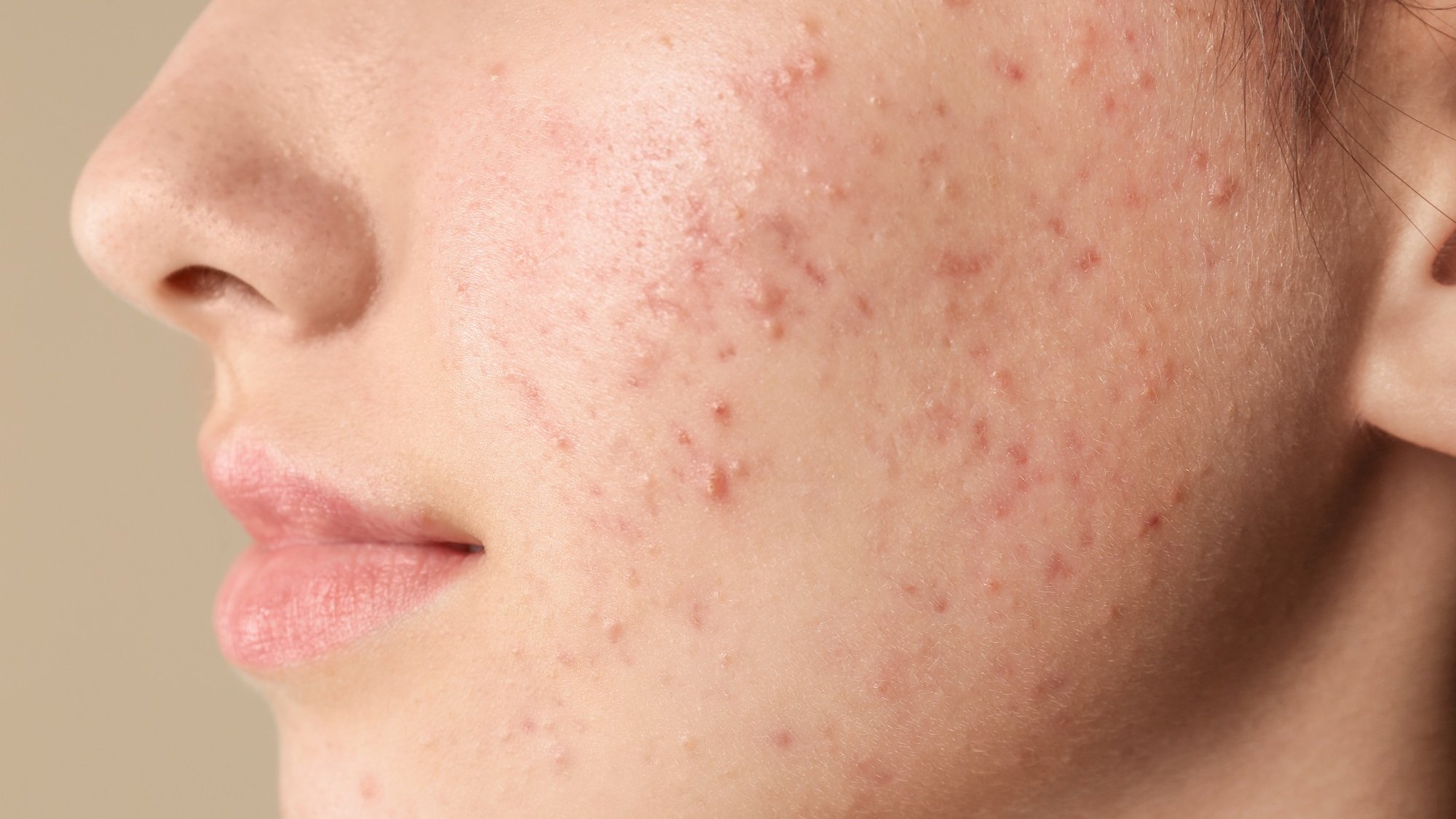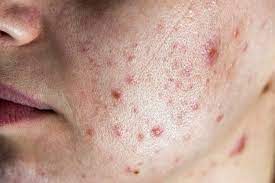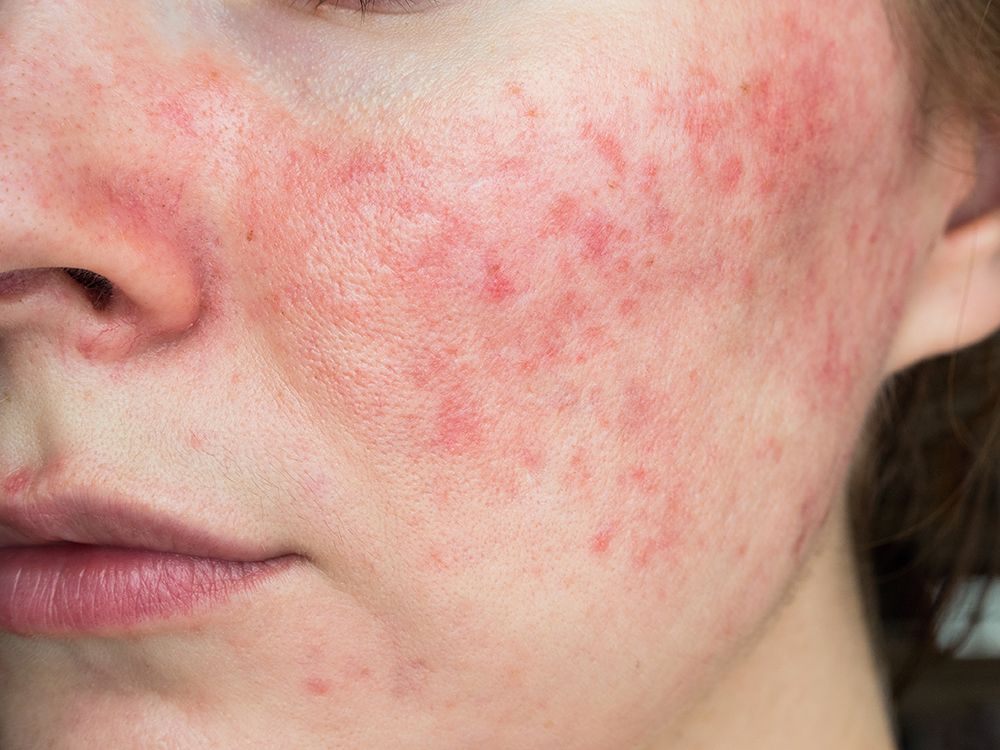Pimples, Scars, Blackheads, Whiteheads, Blemish, Acne marks, Acne scar removal, Acne, Clear skin, Mark, Blemish, Discoloration, Spots, Acne scars, Scars, Pustules.
What is acne?
Your skin has tiny holes called pores that can become blocked by oil, bacteria, dead skin cells, and dirt. When this occurs, you may develop a pimple, sometimes also called a zit or blemish.
If you get pimples often, especially several at once repeatedly, you may have acne.
Root Cause of Disease
Acne has three causes, They are:
- Overactive sebaceous glands
- Abnormal shedding of dead skin cells
- Fast production of acne causing bacteria
Symptoms
Acne is a skin condition that occurs when your hair follicles become plugged with oil and dead skin cells. It causes whiteheads, blackheads or pimples. Acne is most common among teenagers, though it affects people of all ages. Acne symptoms vary depending on the severity of your condition.
- Whiteheads (closed plugged pores
- Blackheads (open plugged pores)
- Small red, tender bumps (papules)
- Pimples (pustules), which are papules with pus at their tips
- Large, solid, painful lumps under the skin (nodules)
- Painful, pus-filled lumps under the skin (cystic lesions)
Causes
Acne is the eighth most common inflammatory dermatological concern worldwide. It occurs especially in teenagers due to hormonal fluctuations resulting in clogging of the skin pores by excessive skin oil or sebum, dead skin cells, dirt, and bacteria. If you are having acne, one or more possible reasons behind their presence can be:
- Bacteria: A bacterium called Propionibacterium Acnes or P. Acnes that is naturally present on the skin surface starts to build up under the skin due to poor skin hygiene. This ultimately results in acne breakouts.
- Clogged skin pores: Acne can commonly occur in people having oily skin type which means there is excessive release of sebum by the sebaceous glands that clogs the pores along with the rapid turnover of skin cells that can lead to blocked-up hair follicles.
- Family history: According to scientific evidence, people can also have a genetic predisposition for acne. So, if one of your close blood relatives like a parent or siblings has acne you are more likely to have the same skin condition.
- Contact skin irritation: Anything which irritates the skin ranging from harsh cleansers to the use of razors on dry skin can affect the skin’s defenses and lead to inflammation of the skin as a positive reaction. Thus, causing acne.
- Emotional stress: Researchers have found out that there is a link between stress and acne flare-ups. When you constantly feel anxious, scared, or are loaded with mental pressure, then the adrenal glands release an increased amount of cortisol hormone which is responsible for more sebum production and worsening of acne.
- Physical stress: A physical strain on your body potentially caused due to lack of sleep, extreme weather, dehydration, certain illness, and exposure to environmental factors like air pollution can trigger hormonal fluctuations, skin inflammation, and weakened immunity. Any one of these factors can cause adult acne.
- Use of wrong hair and skin products: Some oil-based beauty products used on the skin or for hair can trigger acne breakouts. These include greasy makeup, face moisturizers, sunscreens, cleansers and creams, styling products, shampoo and conditioner, especially leave-in conditioners. Hence, one must look for products labeled as ‘non-comedogenic’, ‘oil-free’, ‘non-acnegenic’, or ‘won’t clog pores’.
Home Remedies to treat Acne
Remedy – 1: Honey and Turmeric
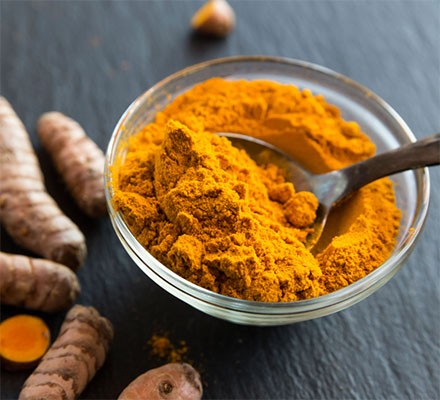
Honey and turmeric are most commonly available ingredient in every kitchen. Studies show that skincare products formulated with turmeric and curcumin can help improve the appearance of skin tone irregularities, like blotchiness, redness, and unevenness.
Honey’s natural enzyme activity gently exfoliates the skin to help to keep the pores clear of dirt, oil, and impurities, which can contribute to acne and blackheads. It also helps to reduce breakouts by managing bacteria on the skin.
Turmeric is an anti-inflammatory, which will help shrink the size of the pimple. It also helps remove excess oil from the skin. Honey helps ward off bacteria in a pimple and also has anti-microbial properties.
Procedure:
Add 1⁄2 teaspoon of turmeric to 1 tablespoon of honey and mix well. Apply on wet skin and leave on for five minutes. Rinse off with water. Do this 3 times a week for better and fast results.
Product links: Honey , Turmeric
Remedy – 2: Honey and Cinnamon
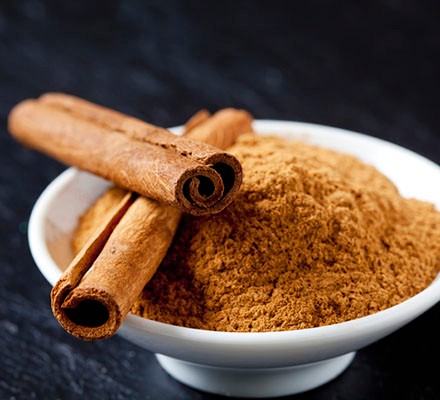
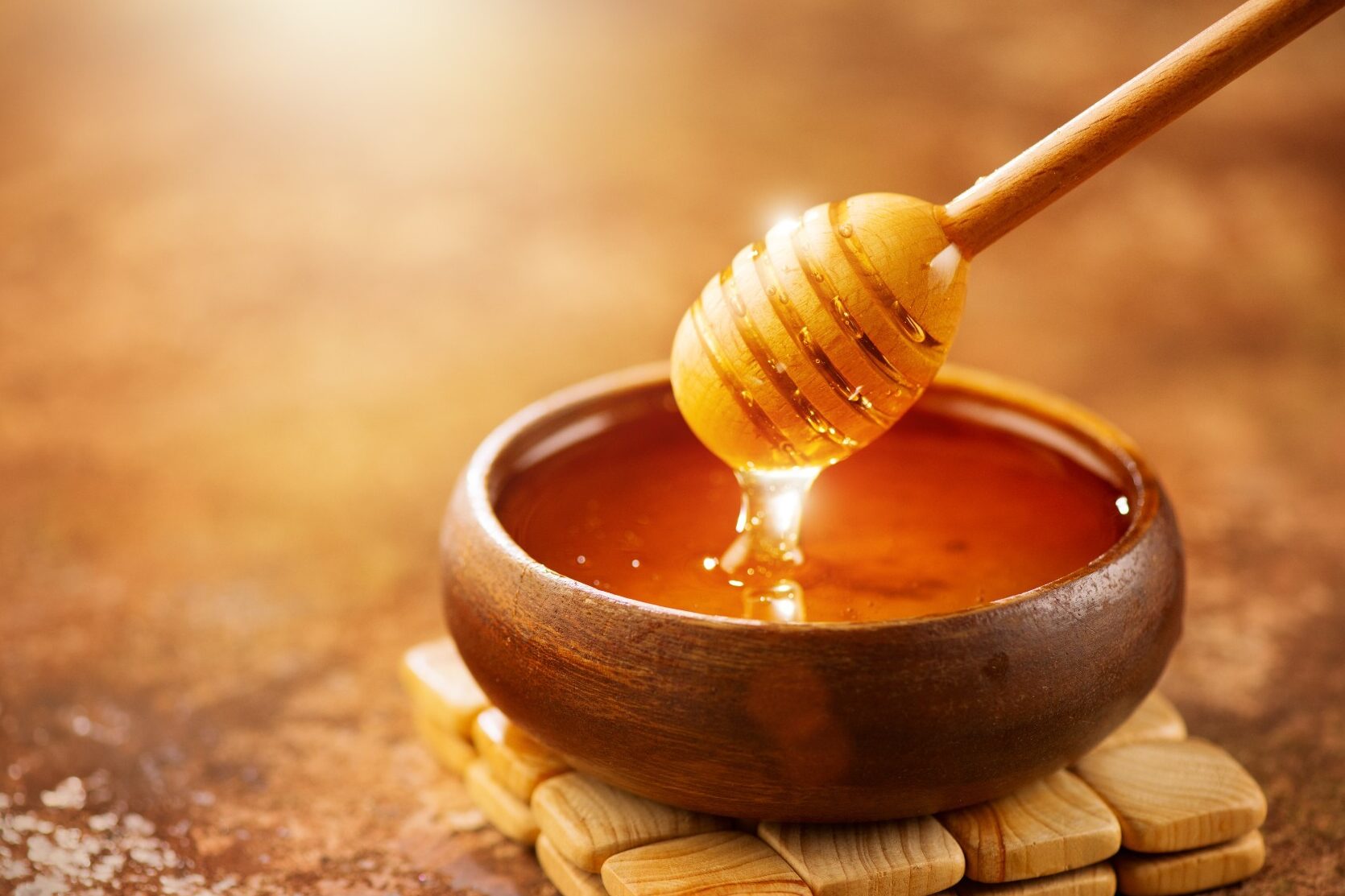
Cinnamon contains antiseptic properties which makes it an excellent ingredient in the treatment of acne, pimples and blackheads.
Here are two yummy ingredients that can make your face smell yummy and also treat pimples! These ingredients remove acne from its roots by getting rid of acne-causing bacteria due to their antibacterial effects. In fact, studies have found that honey has properties that can block the growth of pimple-causing bacteria.
Procedure:
- Mix 2 tablespoons of honey with 1 teaspoon of cinnamon powder to form a paste.
- Cleanse your face, apply this mask on and leave it for 15 minutes.
- Wash it off with cold water.
Product Links: Honey , Cinnamon
Other Remedies
Aloe Vera
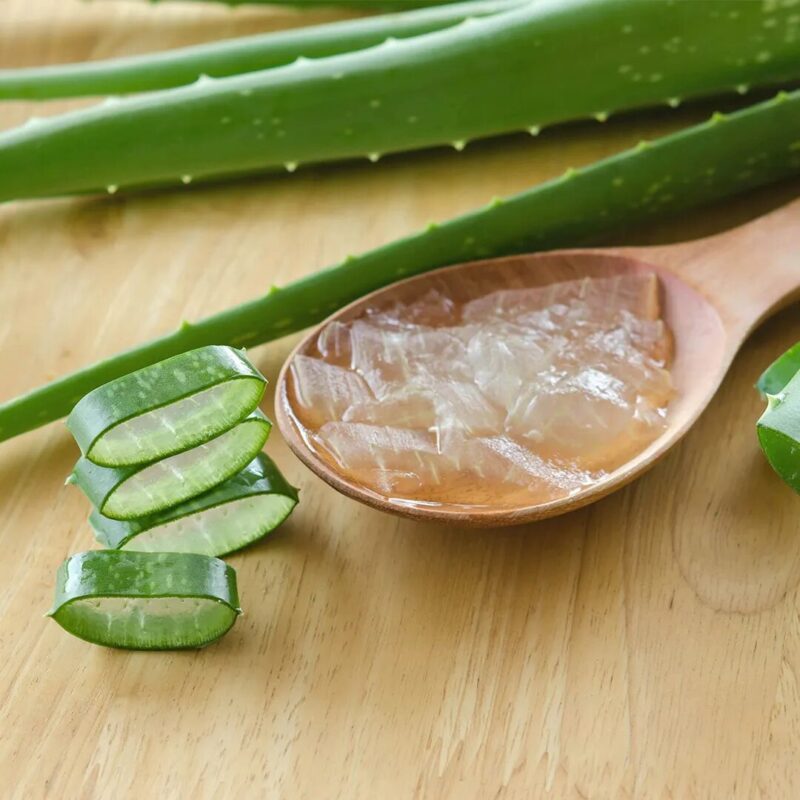
Aloe vera is truly a wonderful ingredient that nature has in abundance. While it has a soothing effect on the skin, aloe vera helps treat pimples owing to its rich sulphur and salicylic acid content This helps reduces redness and the pain that is a side effect of pimples. Since it is an astringent, aloe vera also removes excessive oil from the pimple and speeds up recovery.
If you apply aloe vera gel on your face twice every day, you will have skin that is moisturized and free of blemishes and scars. Aloe vera, according to studies, only moisturizes the top layer of the skin. But it has healing properties to improve other skin conditions.
Product link: Aloe Vera gel
Green Tea
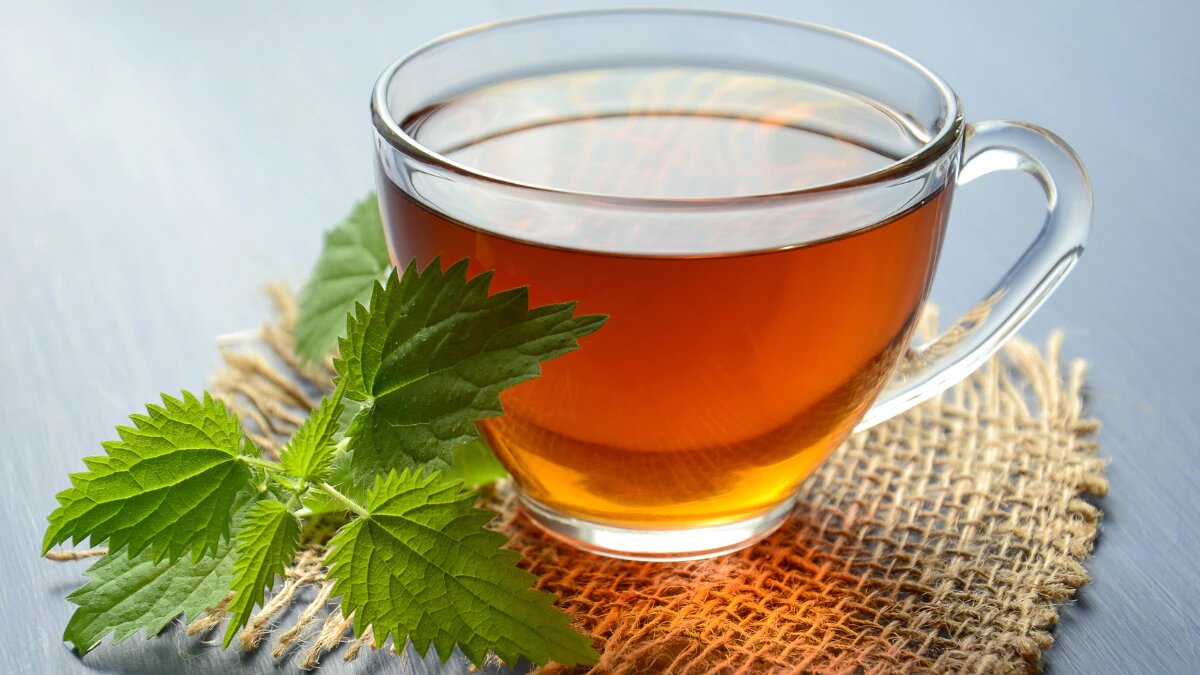
Green Tea has vitamin E and vitamin B2 present in it which helps in maintaining skin health. Vitamin B2 helps in keeping the skin youthful and firm, while vitamin E helps in new skin cell growth and also makes the skin softer and glowing.
Green tea has antioxidant, anti-inflammatory, and antimicrobial properties, a green tea face mask can help benefit your skin in a variety of ways. Not only can it protect your skin from premature aging, UV damage, redness, and irritation, but it also has the ability to fight off bacteria that can lead to acne breakouts.
Procedure:
Boil green tea leaves in one cup of water for about 15 minutes. Strain it and apply on your pimples using a cotton ball. Do this 2-3 times a day and say good bye to pimples.
Product link: Green Tea
Tea tree oil
Tea tree oil is one of the most popular natural cures which you can use for skin acne. This natural cure acts as an antiseptic and also it disinfects the pores. Also, it kills the bacteria which cause acne. You should apply one drop of tea tree oil to the affected area. Do it 3 times per day. If you apply undiluted tea tree oil and it causes you over-drying, redness, or skin irritation, then you should dilute it in water or you can mix it with Aloe Vera gel and then apply it.
Fenugreek
Fenugreek can be also used as a natural cure for skin acne because it has antiseptic, antioxidant, and anti-inflammatory properties. You should mix fresh fenugreek leaves with water to make a smooth paste. You should apply this paste to the affected area and let it stay there for about ten to fifteen minutes. Then, you should wash your face with warm water. You should repeat this process for 3 to 4 days to allow your skin acne to heal. Also, you can grind one teaspoon of fenugreek seeds into a fine powder and you should add a small amount of warm water to it to make a paste. You should apply this paste to the affected areas. You should let it stay there for twenty minutes or overnight and then you should rinse it off. You should do this skin acne natural treatment 2 or 3 times per week.
Orange peel
Orange peel has acidic properties and Vitamin C which is making it a perfect natural cure for acne . You can use the peel and juice from orange but the peel is a more effective home remedy for your skin acne. You should put the orange peel in the sun and you should let it completely dry out. You should grind the dried peel into a powder and you should add water to make a paste. You should apply this paste to the affected areas and you should let it stay there for ten to fifteen minutes. Then, you should wash your face with warm water.
Papaya
Papaya is one of the essential ingredients in many beauty products which are found on the markets. The plain raw papaya is an all-natural acne remedy which can remove the dead skin cells and excess lipids from the surface of your skin and it is leaving your skin smooth and soft. Papaya has an enzyme called papain which can reduce inflammation and also it prevents the pus from forming. To do this natural treatment you will need one fresh papaya. You should rinse your face with water and pat dry. You should mash up the flesh of the papaya well until it is of a consistency which can be easily applied to your skin. You should leave it on for fifteen to twenty minutes and then you should rinse it off completely with warm water. If you have noticed that your skin gets dry after you cleanse it, then you should use a moisturizer for your skin.
Preventions
There are many preventive measures we can take to keep our skin acne free:
Properly wash your face
Pimples can appear anywhere on the skin, but they most often occur on the face. Washing your face twice a day can help control the excess oil production and keep your skin clear.
Use a moisturizer
Moisturizers help skin stay hydrated, which makes a big difference for acne-prone skin. If your skin gets too dry, it will produce oil (sebum) to counterbalance the dryness. And excess of sebum can cause pimples.
Stay hydrated
If you’re dehydrated, your body may signal your skin’s oil glands to produce more oil. Dehydration also gives your skin a dull appearance and promotes inflammation and discoloration. To keep your body well-hydrated, aim to drink at least eight, 8-ounce glasses of water each day.
Try not to touch your face
Touching your face can transfer bacteria — and those pore-clogging impurities onto your skin. It’s tough to avoid touching your face but try to pay attention to how often you touch your face and stop yourself in the act as much as possible.
Don’t be a pimple popper
While it might feel practically impossible to resist squeezing that larger-than-life whitehead on the tip of your nose, your best bet is to avoid popping zits. Popped pimples often bleed, but they can also make the problem worse by: becoming inflamed and clogging surrounding pores, getting infected, leaving behind scars.

